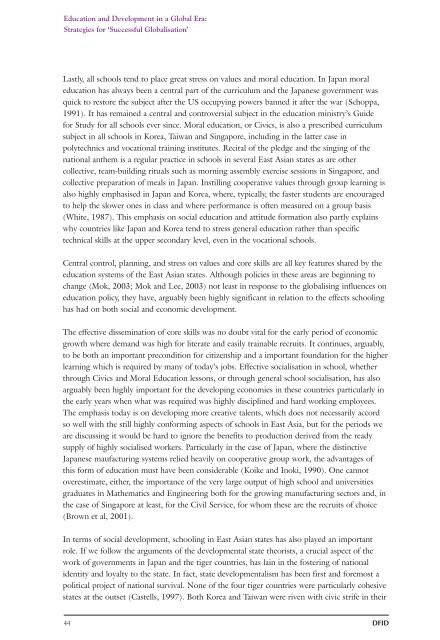education-dev-global-era-69
education-dev-global-era-69
education-dev-global-era-69
Create successful ePaper yourself
Turn your PDF publications into a flip-book with our unique Google optimized e-Paper software.
Education and Development in a Global Era:Strategies for ‘Successful Globalisation’Lastly, all schools tend to place great stress on values and moral <strong>education</strong>. In Japan moral<strong>education</strong> has always been a central part of the curriculum and the Japanese government wasquick to restore the subject after the US occupying powers banned it after the war (Schoppa,1991). It has remained a central and controversial subject in the <strong>education</strong> ministry’s Guidefor Study for all schools ever since. Moral <strong>education</strong>, or Civics, is also a prescribed curriculumsubject in all schools in Korea, Taiwan and Singapore, including in the latter case inpolytechnics and vocational training institutes. Recital of the pledge and the singing of thenational anthem is a regular practice in schools in sev<strong>era</strong>l East Asian states as are othercollective, team-building rituals such as morning assembly exercise sessions in Singapore, andcollective preparation of meals in Japan. Instilling coop<strong>era</strong>tive values through group learning isalso highly emphasised in Japan and Korea, where, typically, the faster students are encouragedto help the slower ones in class and where performance is often measured on a group basis(White, 1987). This emphasis on social <strong>education</strong> and attitude formation also partly explainswhy countries like Japan and Korea tend to stress gen<strong>era</strong>l <strong>education</strong> rather than specifictechnical skills at the upper secondary level, even in the vocational schools.Central control, planning, and stress on values and core skills are all key features shared by the<strong>education</strong> systems of the East Asian states. Although policies in these areas are beginning tochange (Mok, 2003; Mok and Lee, 2003) not least in response to the <strong>global</strong>ising influences on<strong>education</strong> policy, they have, arguably been highly significant in relation to the effects schoolinghas had on both social and economic <strong>dev</strong>elopment.The effective dissemination of core skills was no doubt vital for the early period of economicgrowth where demand was high for lit<strong>era</strong>te and easily trainable recruits. It continues, arguably,to be both an important precondition for citizenship and a important foundation for the higherlearning which is required by many of today’s jobs. Effective socialisation in school, whetherthrough Civics and Moral Education lessons, or through gen<strong>era</strong>l school socialisation, has alsoarguably been highly important for the <strong>dev</strong>eloping economies in these countries particularly inthe early years when what was required was highly disciplined and hard working employees.The emphasis today is on <strong>dev</strong>eloping more creative talents, which does not necessarily accordso well with the still highly conforming aspects of schools in East Asia, but for the periods weare discussing it would be hard to ignore the benefits to production derived from the readysupply of highly socialised workers. Particularly in the case of Japan, where the distinctiveJapanese maufacturing systems relied heavily on coop<strong>era</strong>tive group work, the advantages ofthis form of <strong>education</strong> must have been consid<strong>era</strong>ble (Koike and Inoki, 1990). One cannotoverestimate, either, the importance of the very large output of high school and universitiesgraduates in Mathematics and Engineering both for the growing manufacturing sectors and, inthe case of Singapore at least, for the Civil Service, for whom these are the recruits of choice(Brown et al, 2001).In terms of social <strong>dev</strong>elopment, schooling in East Asian states has also played an importantrole. If we follow the arguments of the <strong>dev</strong>elopmental state theorists, a crucial aspect of thework of governments in Japan and the tiger countries, has lain in the fostering of nationalidentity and loyalty to the state. In fact, state <strong>dev</strong>elopmentalism has been first and foremost apolitical project of national survival. None of the four tiger countries were particularly cohesivestates at the outset (Castells, 1997). Both Korea and Taiwan were riven with civic strife in their44 DFID





